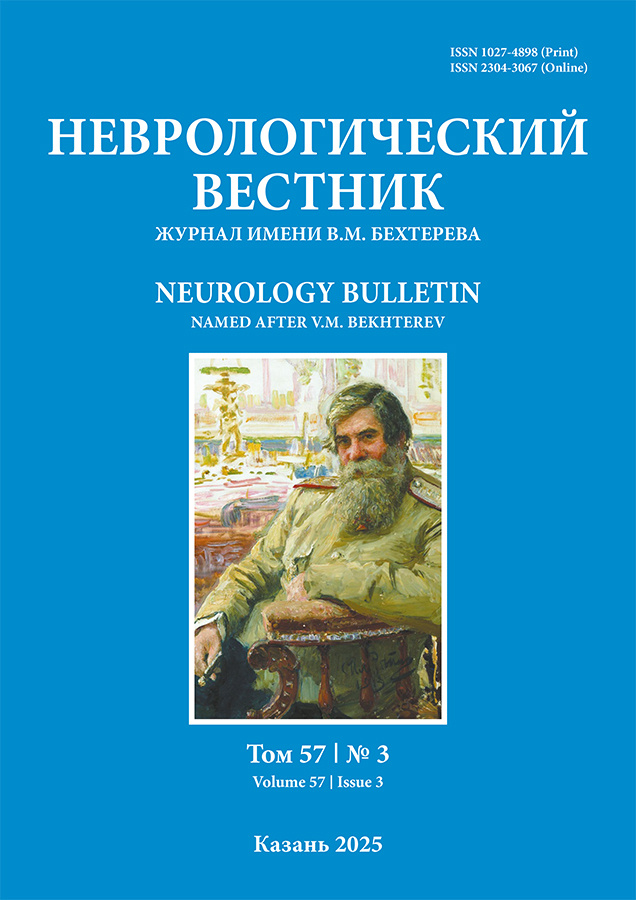Characteristics of psychological maladjustment in patients with posterior segment eye pathology
- Authors: Yakovlev D.A.1, Labaeva E.Y.2, Voskresenskaya A.A.2,3, Kuzmina S.V.1, Pozdeyeva N.A.2,3
-
Affiliations:
- Kazan State Medical University
- Inter-industry Scientific Technical Complex "Eye Microsurgery" named after academician S.N. Fedorov
- Postgraduate Doctors Training Institute
- Issue: Vol LVII, No 3 (2025)
- Pages: 258-265
- Section: Original study arcticles
- Submitted: 01.04.2025
- Accepted: 05.05.2025
- Published: 30.09.2025
- URL: https://journals.eco-vector.com/1027-4898/article/view/677933
- DOI: https://doi.org/10.17816/nb677933
- EDN: https://elibrary.ru/GNCJCO
- ID: 677933
Cite item
Abstract
BACKGROUND: The analysis of modern studies shows a high prevalence of non-psychotic psychiatric disorders in individuals with ophthalmic pathology.
AIM: To evaluate the characteristics of psychological maladjustment in patients with posterior segment eye pathology.
METHODS: This study is a single-center observational study using consecutive sampling of patients with confirmed diagnoses of “age-related macular degeneration” and “glaucoma”. The study was conducted from April 1 to December 31, 2024, at the Cheboksary branch of the S. Fyodorov Eye Microsurgery Complex – National Medical Research Center of the Ministry of Health of the Russian Federation. A clinical survey using psychometric scales, including the Spielberg–Hanin test, Yakhin–Mendelevich clinical questionnaire, and SF–36 health survey questionnaire, was performed.
RESULTS: A total of 79 individuals were examined (47% male, 53% female), with a median age of 69.5 (60–75) years. The participants were divided into two groups: group 1 — patients with age-related macular degeneration; group 2 — patients with glaucoma. For the sample as a whole, the prevalence of anxiety symptoms (27%) and depression (32%) was characteristic. The severity of anxiety symptoms in group 2 was 72.7%, which is statistically significantly higher compared to group 1 (50.0%, p = 0.035). Symptoms of asthenia were more common in patients from group 2 (63.6%), compared to patients with age-related macular degeneration (41.3%, р = 0.041). Obsessive-phobic and autonomic dysfunction symptoms were more characteristic of patients with glaucoma (39.1% and 47.8%, respectively), compared to patients with age-related macular degeneration (12.1% and 24.2%, respectively). The level of statistical significance for obsessive-phobic and autonomic dysfunction symptoms was р = 0.007 and p = 0.028, respectively. The analysis of the quality of life assessment revealed a more significant physical activity limitation, a more pessimistic outlook on treatment prognosis, and a lower mental well-being in patients with glaucoma.
CONCLUSION: The study revealed a high level of psychological maladjustment among patients with posterior segment eye pathology. The obtained data can be used to develop personalized treatment plans that consider both the ophthalmic diagnosis and the mental status of patients.
Full Text
About the authors
Denis A. Yakovlev
Kazan State Medical University
Author for correspondence.
Email: doc.denis.yakovlev@mail.ru
ORCID iD: 0009-0007-1032-8033
SPIN-code: 6998-9549
Russian Federation, Kazan
Ekaterina Yu. Labaeva
Inter-industry Scientific Technical Complex "Eye Microsurgery" named after academician S.N. Fedorov
Email: doc.e.lab@mail.ru
ORCID iD: 0009-0001-8371-0459
Russian Federation, Cheboksary
Anna A. Voskresenskaya
Inter-industry Scientific Technical Complex "Eye Microsurgery" named after academician S.N. Fedorov; Postgraduate Doctors Training Institute
Email: vsolaris@mail.ru
ORCID iD: 0000-0003-4213-4923
SPIN-code: 8117-8135
MD, Cand. Sci. (Medicine)
Russian Federation, Cheboksary; CheboksarySvetlana V. Kuzmina
Kazan State Medical University
Email: skouzmina21@list.ru
ORCID iD: 0000-0002-7330-1213
SPIN-code: 8014-5669
MD, Dr. Sci. (Medicine), Assistant Professor
Russian Federation, KazanNadezhda A. Pozdeyeva
Inter-industry Scientific Technical Complex "Eye Microsurgery" named after academician S.N. Fedorov; Postgraduate Doctors Training Institute
Email: npozdeeva@mail.ru
ORCID iD: 0000-0003-3637-3645
SPIN-code: 2878-7280
MD, Dr. Sci. (Medicine), Professor
Russian Federation, Cheboksary; CheboksaryReferences
- Badimova AV. Epidemiological features of eye disorders morbidity and disability in Russia and abroad. Eruditio Juvenium. 2020;8(2):261–268. doi: 10.23888/HMJ202082261-268 EDN: TUKNZY
- World report on vision. Geneva: World Health Organization; 2019. 25 p. URL: https://www.who.int/publications/i/item/world-report-on-vision Jakovlev DA, Shurygina AD, Kuzmina SV, Rascheskov AYu. The prevalence of mental disorders in patients with posterior segment eye disease. Neurology Bulletin. 2023;55(2):52–61. doi: 10.17816/nb303671 EDN: XQJQAG
- Nekrasov VA, Sluchevskaya SF. Mental disorders of late age: an educational and methodological guide. Saint Petersburg: NWSMU im. I.I. Mechnikova; 2015. 51 p. (In Russ.)
Supplementary files








